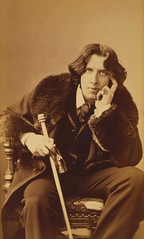The Happy Prince (6)
Il Principe Felice (6)
Vai alla puntata: 1•2•3•4•5•7
All the next day he sat on the Prince’s shoulder, and told him stories of what he had seen in strange lands.
Tutto il giorno successivo sedette sulla spalla del Principe e gli raccontò delle storie su quello che aveva visto in terre sconosciute.
He told him of the red ibises, who stand in long rows on the banks of the Nile, and catch gold-fish in their beaks;
Gli disse degli ibis rossi, che stanno in lunghe file sulle rive del Nilo e catturano pesci rossi coi loro becchi;
of the Sphinx, who is as old as the world itself, and lives in the desert, and knows everything; of the merchants, who walk slowly by the side of their camels, and carry amber beads in their hands;
della Sfinge, che è vecchia come il mondo stesso, vive nel deserto e conosce tutto; dei mercanti, che camminano lentamente accanto ai loro cammelli e portano collane di ambra tra le mani;
>>> of the King of the Mountains of the Moon, who is as black as ebony, and worships a large crystal;
del Re delle Montagne della Luna, che è nero come l’ebano e venera un grande cristallo;
of the great green snake that sleeps in a palm-tree, and has twenty priests to feed it with honey-cakes; dell’enorme serpente verde che dorme su una palma ed ha venti sacerdoti che lo cibano con dolci al miele;
and of the pygmies who sail over a big lake on large flat leaves, and are always at war with the butterflies.
e dei pigmei che navigano su un grande lago con larghe foglie piatte e sono sempre in guerra con le farfalle.
“Dear little Swallow,” said the Prince, “you tell me of marvelous things, but more marvellous than anything is the suffering of men and of women.
“Caro piccolo Rondinotto,” disse il Principe, “mi racconti cose straordinarie, ma più straordinaria di tuttti è la sofferenza di uomini e donne.
There is no Mystery so great as Misery.
Non c’è Mistero più grande dell’Infelicità.
Fly over my city, little Swallow, and tell me what you see there.”
Vola sopra la mia città, piccolo Rondinotto e dimmi che cosa vedi.”
So the Swallow flew over the great city, and saw the rich making merry in their beautiful houses, while the beggars were sitting at the gates.
Così il Rondinotto volò sopra la grande città e vide i ricchi far baldoria nelle loro belle case, mentre I mendicanti sedevano ai cancelli.
He flew into dark lanes, and saw the white faces of starving children looking out listlessly at the black streets.
Volò nei vicoli bui e vide le facce bianche dei bambini affamati che con sguardo apatico fissavano le strade nere.
Under the archway of a bridge two little boys were lying in one another’s arms to try and keep themselves warm.
Sotto un ponte due bambini stavano l’uno nelle braccia dell’altro per provare a tenersi caldi.
“How hungry we are!” they said.
“Come siamo affamati!” dissero.
“You must not lie here,” shouted the Watchman, and they wandered out into the rain.
“Non potete stare qui,” gridò la Sentinella e loro si allontanarono nella pioggia.
Then he flew back and told the Prince what he had seen.
Poi tornò indietro e disse al Principe ciò che aveva visto.
“I am covered with fine gold,” said the Prince, “you must take it off, leaf by leaf, and give it to my poor; the living always think that gold can make them happy.”
“Sono coperto d’oro zecchino,” disse il Principe, “devi staccarlo, foglia per foglia, e darlo ai miei poveri; gli esseri viventi pensano sempre che l’oro possa renderli felici.”
Leaf after leaf of the fine gold the Swallow picked off, till the Happy Prince looked quite dull and grey.
Foglia dopo foglia d’oro zecchino, tutte vennero tolte dal Rondinotto, finché il Principe Felice sembrò piuttosto opaco e grigio.
Leaf after leaf of the fine gold he brought to the poor, and the children’s faces grew rosier, and they laughed and played games in the street.
Foglia dopo foglia tutte vennero portate ai poveri e le faccie dei bambini diventarono più rosee ed essi risero e giocarono per strada.
“We have bread now!” they cried.
“Adesso abbiamo il pane!” esclamarono.
Then the snow came, and after the snow came the frost.
Poi arrivò la neve, e dopo la neve arrivò il gelo.
The streets looked as if they were made of silver, they were so bright and glistening; long icicles like crystal daggers hung down from the eaves of the houses, everybody went about in furs, and the little boys wore scarlet caps and skated on the ice.
Le strade sembravano fatte d’argento, tanto erano luminose e scintillanti; lunghi ghiaccioli come pugnali di cristallo stavano appesi dalle grondaie delle case, tutti andavano in giro in pelliccia e i bambini indossavano berretti rossi e pattinavano sul ghiaccio.
The poor little Swallow grew colder and colder, but he would not leave the Prince, he loved him too well.
Il povero piccolo Rondinotto diventò sempre più freddo, ma non voleva lasciare il Principe, tanto lo amava dal profondo.
He picked up crumbs outside the baker’s door when the baker was not looking and tried to keep himself warm by flapping his wings.
Raccoglieva delle briciole fuori dalla porta del fornaio quando non guardava e cercò di tenersi caldo battendo le ali.
But at last he knew that he was going to die.
Ma alla fine sapeva che sarebbe morto.
(continua)


